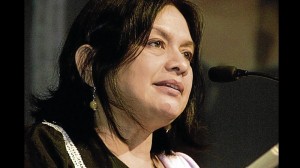The year was 1971. The writ of habeas corpus had just been suspended, and we were perplexed. We didn’t know how to react to it, despite the fact that activists had predicted that martial law would indeed be declared. The most vocal about it was Senator Ninoy Aquino.
In the meantime, we marched and protested against imperialism, feudalism and bureaucratic capitalism. Thereafter, Camps Aguinaldo, Bonifacio, Crame and Bicutan would take on new meanings for us.
I had just finished a production of “Jesus Christ Superstar,” and had “discovered” Marilen Martinez, who then got her own show on ABS-CBN after making an appearance in one of their noontime shows to promote our rock musical.
Weapons
Gintong Silahis, the cultural arm of Samahang Demokratkong Kabataan (SDK) was founded, and Sixto Carlos Jr. asked me to direct their initial production, “Barikada.” For two weeks, the students, faculty and community of UP withstood the military’s entry into the campus. They fought valiantly against superior forces with firecrackers, Molotov bombs and other weapons.
Right after auditions, President Ferdinand Marcos suspended the writ of habeas corpus. So, the rehearsal hall was almost empty, except for GS officials. I cannot forget the perplexed faces of Tony Tujan and Mon Coronel then.
My mentor, Amelia Lapeña Bonifacio, handed me her new play, “The Short, Short Life of Citizen Juan,” in time for the annual production of the Sigma Delta Phi sorority, whose grand archon was beauty queen, Nelia Sancho, who asked me to direct it. The Sigma Delta Sorority is known for its cultural endeavors, just as the Upsilon Sigma Phi, its brother fraternity, was noted for its original musicals, like “Aloyan” and “Hanako.”
After reading the play, I decided to cast Ruby Umali aka Dayang Dayang in the lead opposite Nestor Torre. NUT and I had worked together in plays like Repertory Philippines’ “Mrs. Warren’s Profession.”
I also cast UP Dramatic Club contemporary, Joonee Gamboa, my brother Tony Cervantes, as well as Sigma Delta alumnae, Winnie Collas Monsod, Nanette Tiongco Puyat and Cita Yabut.A superb cast!
Crowd scenes
Years later, I did a play (“Walking Canes and Fans”) in New York whose cast included Edwin del Rosario, who was part of the crowd scenes in “Citizen Juan.” Twenty years later, he reminded me of the 1971 production—glowingly.
Since Ruby and Nestor were newsworthy (not to mention Nelia herself), we had ample publicity for “Citizen Juan” in Manila dailies. It was fortuitous that there was a World Theater Festival being held in Manila at the time.
For some reason, UP productions weren’t included in its lineup. But, after some intrepid delegates had read about the plays, they went to watch them on their own and told other delegates about the politically themed productions. A French delegate couldn’t believe that “Barikada” and “Citizen Juan” were done by the same director.
Tragedy
On the other hand, I was so impressed with the performance of Winnie Monsod that, in 1974, after being incarcerated, I directed her in Recaredo Demetillo’s Palanca-winning play, “The Heart of Emptiness Is Black,” the Panay version of the Camelot tragedy.
Winnie was nothing short of marvelous — but, that’s jumping ahead. In “Citizen Juan,” Nestor, Ruby, Joonee and Tony were dedicated actors who set an exemplary example for the large student cast, so I had a relatively easy time helming the play. Besides, Nelia had an efficient production staff that included Lena Lubi and Sandra Chavez, now the manager of Sharon Cuneta.
Amelia, who rewrote the script as we rehearsed it, was very happy about how the production turned out. It was a learning experience for all of us. I learned from Amelia, while the playwright learned from the production, and the student cast learned from the play’s more experienced cast members. Truly a memorable year for me!


